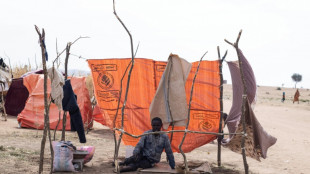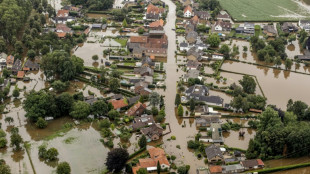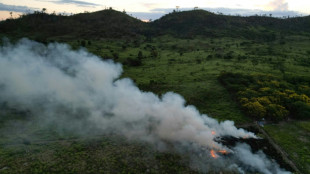
-
 Scandic Trust Group strengthens sales network with First Idea Consultant
Scandic Trust Group strengthens sales network with First Idea Consultant
-
No end to Sudan fighting despite RSF paramilitaries backing truce plan

-
 US officials, NGOs cry foul as Washington snubs UN rights review
US officials, NGOs cry foul as Washington snubs UN rights review
-
Injured teen medal hope Tabanelli risks missing home Winter Olympics

-
 Bellingham, Foden recalled to England squad for World Cup qualifiers
Bellingham, Foden recalled to England squad for World Cup qualifiers
-
Tanzania rights group condemns 'reprisal killings' of civilians

-
 Slot urges patience as Isak returns to training with Liverpool
Slot urges patience as Isak returns to training with Liverpool
-
Rees-Zammit set for Wales return with bench role against Argentina

-
 China's new aircraft carrier enters service in key move to modernise fleet
China's new aircraft carrier enters service in key move to modernise fleet
-
Operation Cloudburst: Dutch train for 'water bomb' floods

-
 Leaders turn up the heat on fossil fuels at Amazon climate summit
Leaders turn up the heat on fossil fuels at Amazon climate summit
-
US travel woes mount as govt shutdown prompts flight cuts

-
 North Korea fires unidentified ballistic missile: Seoul military
North Korea fires unidentified ballistic missile: Seoul military
-
West Bank's ancient olive tree a 'symbol of Palestinian endurance'

-
 Global tech tensions overshadow Web Summit's AI and robots
Global tech tensions overshadow Web Summit's AI and robots
-
Green shines as Suns thump Clippers 115-102

-
 Japan to screen #MeToo film months after Oscar nomination
Japan to screen #MeToo film months after Oscar nomination
-
Erasmus relishing 'brutal' France re-match on Paris return

-
 Rejuvenated Vlahovic taking the reins for Juve ahead of Turin derby
Rejuvenated Vlahovic taking the reins for Juve ahead of Turin derby
-
'Well-oiled' Leipzig humming along in Bayern's slipstream

-
 Bangladesh cricket probes sexual harassment claims
Bangladesh cricket probes sexual harassment claims
-
NFL-best Broncos edge Raiders to win seventh in a row

-
 Deadly Typhoon Kalmaegi ravages Vietnam, Philippines
Deadly Typhoon Kalmaegi ravages Vietnam, Philippines
-
Three killed in new US strike on alleged drug boat, toll at 70

-
 Chinese microdrama creators turn to AI despite job loss concerns
Chinese microdrama creators turn to AI despite job loss concerns
-
Trump hails Central Asia's 'unbelievable potential' at summit

-
 Kolya, the Ukrainian teen preparing for frontline battle
Kolya, the Ukrainian teen preparing for frontline battle
-
Big leap in quest to get to bottom of climate ice mystery

-
 Markets drop as valuations and US jobs, rates spook investors
Markets drop as valuations and US jobs, rates spook investors
-
'Soap opera on cocaine': how vertical dramas flipped Hollywood

-
 Under pressure? EU states on edge over migrant burden-sharing
Under pressure? EU states on edge over migrant burden-sharing
-
US influencers falsely associate Mamdani with extremist group

-
 Hungary's Orban to meet Trump in face of Russia oil sanctions
Hungary's Orban to meet Trump in face of Russia oil sanctions
-
US facing travel chaos as flights cut due to govt shutdown

-
 Liverpool and Man City renew rivalry as they try to narrow Arsenal gap
Liverpool and Man City renew rivalry as they try to narrow Arsenal gap
-
UK's Andrew asked to testify over Epstein as he formally loses titles

-
 Local hero: 'DC sandwich guy' found not guilty of assaulting officer with sub
Local hero: 'DC sandwich guy' found not guilty of assaulting officer with sub
-
Dead famous: Paris puts heritage graves up for grabs

-
 UK grandmother on Indonesia death row flies home
UK grandmother on Indonesia death row flies home
-
Former NFL star Brown extradited from Dubai to face trial in shooting - police

-
 Chile presidential hopeful vows to expel 'criminal' migrants to El Salvador
Chile presidential hopeful vows to expel 'criminal' migrants to El Salvador
-
Trump event paused in Oval Office when guest faints

-
 NFL Colts add Sauce to recipe while Patriots confront Baker
NFL Colts add Sauce to recipe while Patriots confront Baker
-
Home owned by Miami Heat coach Spoelstra damaged by fire

-
 Tesla shareholders approve Musk's $1 trillion pay package
Tesla shareholders approve Musk's $1 trillion pay package
-
World leaders launch fund to save forests, get first $5 bn

-
 Villa edge Maccabi Tel Aviv in fraught Europa League match
Villa edge Maccabi Tel Aviv in fraught Europa League match
-
Protests as Villa beat Maccabi Tel Aviv under tight security

-
 US Supreme Court backs Trump admin's passport gender policy
US Supreme Court backs Trump admin's passport gender policy
-
Japan boss Jones backs Farrell to revive Ireland's fortunes


India's Nipah virus outbreak: what do we know so far?
Authorities in India are scrambling to contain a rare outbreak of Nipah, a virus spread from animals to humans that causes deadly fever with a high mortality rate.
Here is a look at what we know so far:
- What is the Nipah virus? -
The first Nipah outbreak was recorded in 1998 after the virus spread among pig farmers in Malaysia.
The virus is named after the village where it was discovered.
Outbreaks are rare but Nipah has been listed by the World Health Organization (WHO) -- alongside Ebola, Zika and Covid-19 -- as one of several diseases deserving of priority research for their potential to cause a global epidemic.
Nipah usually spreads to humans from animals or through contaminated food, but it can also be transmitted directly between people.
Fruit bats are the natural carriers of the virus and have been identified as the most likely cause of subsequent outbreaks.
Symptoms include intense fever, vomiting and a respiratory infection, but severe cases can involve seizures and brain inflammation that results in a coma.
There is no vaccine for Nipah.
Patients have a mortality rate of between 40 and 75 percent depending on the public health response to the virus, the WHO says.
- What has happened during previous outbreaks? -
The first Nipah outbreak killed more than 100 people in Malaysia and prompted the culling of one million pigs in an effort to contain the virus.
It also spread to Singapore, with 11 cases and one death among slaughterhouse workers who came into contact with pigs imported from Malaysia.
Since then, the disease has mainly been recorded in Bangladesh and India, with both countries reporting their first outbreaks in 2001.
Bangladesh has borne the brunt in recent years, with more than 100 people dying of Nipah since 2001.
Two early outbreaks in India killed more than 50 people before they were brought under control.
The southern state of Kerala has recorded two deaths from Nipah and four other confirmed cases since last month.
Authorities there have closed some schools and instituted mass testing.
This marks Kerala's fourth recorded spate of Nipah cases in five years. The virus killed 17 people during the first instance in 2018.
The state has managed to stamp out previous outbreaks within a matter of weeks through widespread testing and strict isolation of those in contact with patients.
- Are animal-to-human viruses becoming more frequent? -
Having first appeared thousands of years ago, zoonoses -- diseases that can be transmitted from animals to humans -- have multiplied over the past 20 to 30 years.
The growth of international travel has allowed them to spread more quickly.
By occupying increasingly large areas of the planet, experts say, humans also contribute to disruption of the ecosystem and increase the likelihood of random virus mutations that are transmissible to humans.
Industrial farming increases the risk of pathogens spreading between animals while deforestation heightens contact between wildlife, domestic animals and humans.
By mixing more, species will transmit their viruses more, which will promote the emergence of new diseases potentially transmissible to humans.
Climate change will push many animals to flee their ecosystems for more livable lands, a study published by the scientific journal Nature warned in 2022.
According to estimates published in the journal Science in 2018, there are 1.7 million unknown viruses in mammals and birds, 540,000-850,000 of them with the capacity to infect humans.
I.Saadi--SF-PST




